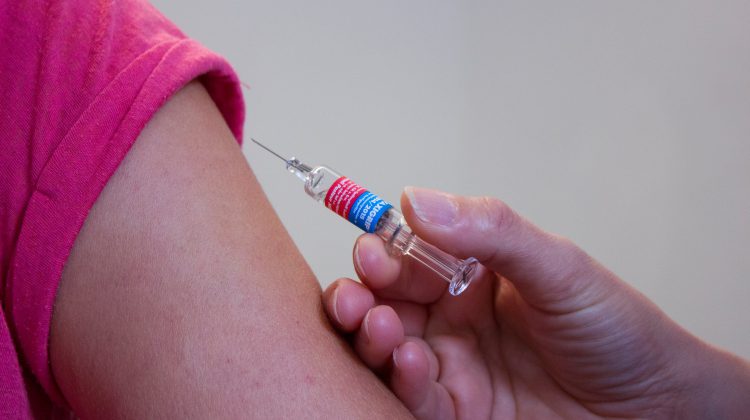(Files by Dione Wearmouth-MyPGNow)
This morning (Dec 23rd), the Moderna COVID-19 vaccine was approved by Health Canada.
It’s the second COVID-19 vaccine to be approved by Health Canada after the Pfizer vaccine has already been approved and given to a number of Health Care workers in Prince George.
Health Canada claims the Pfizer vaccine was 95% effective in preventing COVID-19 beginning 1 week after the second dose, which means that people may not be fully protected until at least 7 days after the second dose
For the Moderna vaccine, Health Canada claims the vaccine was 94.1% effective in preventing COVID-19 beginning 2 weeks after the second dose, which means that people may not be fully protected against COVID-19 until at least 14 days after the second dose.
The Pfizer COVID-19 vaccine is approved for people who are 16 years of age and older, this is because its safety and effectiveness in people under 16 years old are currently unknown.
Meanwhile, the Moderna COVID-19 vaccine is approved for people who are 18 and older because its safety and effectiveness in people under 18 years old aren’t yet known.
According to Health Canada, both the Pfizer vaccine and Moderna vaccine are mRNA vaccines that teaches cells how to make a protein that will trigger an immune response without using the live virus that causes COVID-19.
Health Canada is recommending people with allergies to the Pfizer Vaccine do not receive it as the Pfizer Vaccine has been associated with a rare but serious allergy (anaphylaxis) to polyethylene glycol (PEG).
PEG can be found in some cosmetics, skincare products, laxatives, some processed foods and drinks and other products.
A full list of ingredients in the Pfizer COVID-19 Vaccine is available here, and a list of ingredients in the Moderna Vaccine is available here.
Side Effects:
According to the BC Centre for Disease Control, after receiving the Pfizer vaccine, some people have reported side effects similar to those experienced after a flu shot, including:
- Mild to moderate fatigue
- Pain and in some cases chills
- Headache or joint pain
Health Canada explained that in general, the side effects observed during the clinical trials are similar to what you might have with other vaccines that do not pose a risk to health.
Some side effects from both vaccines were pain at the site of injection, body chills, feeling tired and feeling feverish.
As with all vaccines, there’s a chance that there will be a serious side effect, but these are rare and a serious side effect might be something like an allergic reaction, according to Health Canada.
Distribution of Vaccines:
Currently, Northern Health is distributing the vaccine according to the priority vaccine groups that have been determined by the National Advisory Committee on Immunization.
The BC Centre for Disease Control has approved the following populations to receive the Pfizer COVID-19 vaccine in B.C.
- Residents and staff of long term care facilities
- Residents and staff of assisted living residences
- Essential visitors to residents of long term care facilities and assisted living residences
- Health care workers providing care to COVID-19 patients in settings like intensive care units, COVID-19 medical wards, and emergency departments.
According to Northern Health, as more vaccines are approved by Health Canada, more communities and more groups of people who wish to get vaccinated will.
The Health Authority expects to immunize all Northern BC residents who wish to have the vaccine by the end of 2021.
According to Health Canada, the following populations should be prioritized for early COVID-19 vaccination.
- Residents and staff of shared living settings that provide care for seniors.
- Adults 70 years of age and older, with order of priority:
- Beginning with adults 80 years of age and older
- Decreasing the age limit by 5-year increments to age 70 years as supply becomes available
- Health care workers who have direct contact with patients, including:
- Those who work in health care settings
- Personal support workers
- Adults in Indigenous communities.
How the Vaccines are Administered and Work:
According to Health Canada, both the Pfizer vaccine and Moderna vaccine are mRNA vaccines that teaches cells how to make a protein that will trigger an immune response without using the live virus that causes COVID-19.
The Moderna vaccine is given by a 0.5mL injection into the muscle of the arm, for the vaccine to work best, you need to get 2 doses: a single dose and then a second dose one month apart.
The Pfizer vaccine is given by a 0.3 mL injection into the muscle of the arm as well, but for the vaccine to work best, you need to get 2 doses: a single dose and then a second dose 21 days later.
Once the products are both on the market, both vaccine manufacturers are legally required to submit reports of adverse events to Health Canada.
Additional information can be found on the BC Centre for Disease Control Immunization Manual, as well as the Health Canada Moderna and Pfizer product descriptions.
Something going on in the Cariboo you think people should know about?
Send us a news tip by emailing [email protected].








